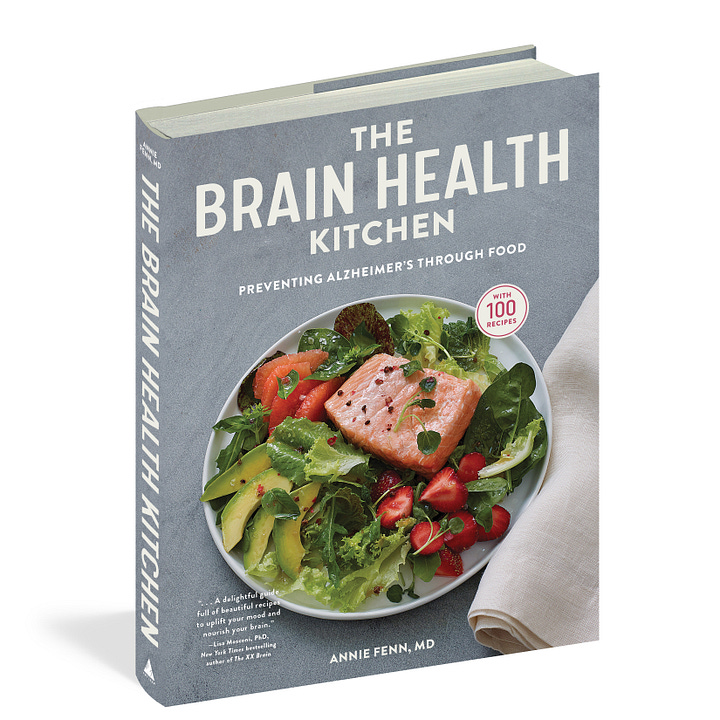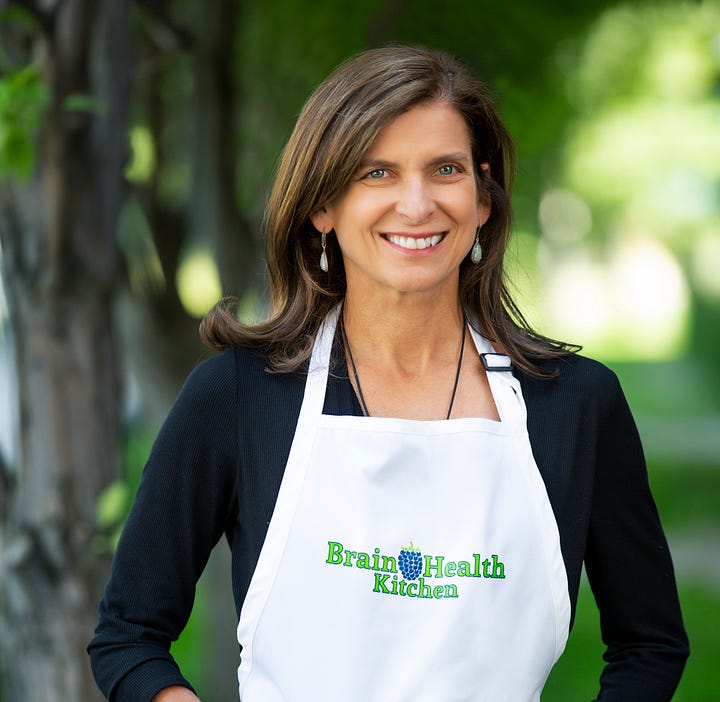Forget Chicken Soup for the Soul. Try Tomato Soup for the Brain.
When Annie Fenn, MD, understood the relationship between hormones, food, & cognitive health, she quit her 20-year career as an OB/Gyn & devoted herself to promoting brain health, one recipe at a time.

Annie Fenn, MD, thought she wanted to be a veterinarian, so off she went to the University of Denver to study how to provide medical care for animals. Then—oops!—she discovered her intractable allergies to cats and horses. And pivoted to med school for humans.
She would make a radical pivot once again after a successful twenty year run as an OB/Gyn, her last five years spent as a specialist in menopausal medicine. “It was during these years of intense focus on perimenopausal women that my interest in brain health was sparked,” she told me. “My patients were complaining about hot flashes and sleep disruption, as you would expect. But the symptoms that bothered them most were the cognitive symptoms—memory loss, mixing up days and numbers, extremely low mental energy, and brain fog.”
Dr. Fenn, too, was going through her own midlife challenges and craved a healthier lifestyle with more sleep, less stress, more time with her kids, and a better creative outlet for her brain. She started with cooking classes. Then a food blog. Then, in 2015, her mother was diagnosed with Alzheimer’s, a degenerative, inheritable disease without a cure which affects twice as many women as men. [I’ve written about this sex-based discrepancy of Alzheimer’s, several times, and about the importance of lifestyle preventions. I even entered a clinical trial with Dr. Lisa Mosconi, which Maria Shriver then covered for the Today Show, to try to get to the bottom of the estrogen loss/Alzheimer’s connection, an area of study that has been—surprise surprise—vastly underfunded because: women.]
For Dr. Fenn, her mother’s diagnosis lead to an ah-ha moment. “It was then, in 2015, that I had an epiphany: I should use my medical degree and culinary experience to spread the word that Alzheimer’s is often preventable with food and lifestyle choices.”
Thus Brain Health Kitchen was born. Since then, she has taught thousands of students, in both hands-on and online classes, about the art of cooking for optimal brain health. She teaches at medical schools, women’s and men’s groups, Alzheimer’s nonprofits, memory care centers, and wellness programs for companies both here in the U.S. and abroad. She offers weeklong Brain Health Retreats in Italy, Panama, and Mexico. She’s published a book, with all of her scholarship, insights, and recipes in it. And she just started a newsletter, on this very platform, I’ve been following avidly since its debut.


Today, lucky us (see below), she’s sharing her tomato soup recipe for optimal brain health. [Note: it’s available only to paid subscribers, but I will repeat myself until I’m blue in the face: if you can’t afford a subscription—especially struggling single parents (been there!) and pensioners—please hit reply either to this email or to the one you’ll get when you subscribe for free below, tell me you need a paid subscription gratis, and I will gift you one, no questions asked!]
But first, before Dr. Fenn’s delicious, brain-boosting tomato soup recipe, a quick interview with her.
Interview with Dr. Annie Fenn, MD
Deborah Copaken: You’ve written a lot about how women are more vulnerable to Alzheimer’s, making up two-thirds of all victims. What is your advice to women at peri-menopause and beyond about fending it off?
Annie Fenn: I am happy to report this is a hot area of research. The answer, while not completely worked out, involves many factors. My best advice for women:
Follow the MIND diet guidelines as closely as possible to cut the risk of getting Alzheimer’s by as much as 53%. (It’s been shown to reduce breast cancer risk by as much as 60%, too.) In my book, I modified the guidelines slightly to reflect new data on the impact of alcohol on brain shrinkage, and the link between certain animal products and dementia.
Be careful with alcohol. Drink very lightly, if at all. Women are drinking more now than ever, and at a time when their brains are most vulnerable. In the largest brain imaging study to date, alcohol had a negative impact on brain volume starting at 4 drinks a week.
If you don’t have a contraindication, take hormone therapy after menopause. Estrogen is neuroprotective. Risks of hormone therapy have been hugely exaggerated by the lay press. In 2023, we now know that taking hormone therapy after menopause can reduce dementia by about half. The more estrogen a woman has been exposed to in her life (both from natural cycling and birth control pills), the lower her risk of Alzheimer’s.
DC: What’s the best time of life to be eating for brain health? Is it too late for those over 65?
AF: Staying healthy at midlife (between the ages of 45 and 65) translates to less Alzheimer’s later. Midlife is when people start accumulating dementia risk factors like heart disease, diabetes, and hypertension, all problems largely preventable with a healthy diet and exercise.
But that doesn’t mean you can’t improve your brain health after age 65. In a Scottish study of 73 to 76-year olds, switching from an American-like diet to a Mediterranean one resulted in better brain volume over time. There are numerous studies to show that eating certain neuroprotective foods, such as leafy greens, will help you age with a robust, voluminous brain.
DC: What about young adults? Shouldn’t they be taking care of their brains, too?
AF: Yes! Certainly the decades between 20 and 35 are when lifestyle habits are laid down for life, such as how one eats, exercises, mitigates stress, and whether one smokes or drinks. Now we are starting to see data that amyloid plaque (one of the problematic proteins in Alzheimer’s) accumulates starting in young adulthood. And certain things, such as lack of sleep, can accelerate this process.
The bottom line: when it comes to Alzheimer’s prevention, it’s never too early or too late to take good care of your brain. Eating a brain-healthy diet is being studied to see if it can slow down mild cognitive impairment (MCI), the earliest stage of Alzheimer’s, and results are promising. Once someone has tipped over into Alzheimer’s, though, a healthy diet is not proven to halt or reverse the disease.
DC: Do you miss practicing medicine?
AF: Yes, all the time. I loved being an OB/GYN physician, I loved taking care of patients, and I loved doing surgery. It was exhausting but also invigorating and intellectually challenging. To be honest, I went through a bit of a funk after I gave it up. It wasn’t until I started Brain Health Kitchen that I figured out what I had been missing—I need to help people. I thrive when I am helping others be their healthiest selves. Now I feel like I’m still practicing medicine; I’m just doing it through the lens of food and lifestyle.
Dr. Annie Fenn’s creamy tomato soup recipe for optimal brain health (The secret “cream”? Cashews!)
Keep reading with a 7-day free trial
Subscribe to Ladyparts to keep reading this post and get 7 days of free access to the full post archives.





